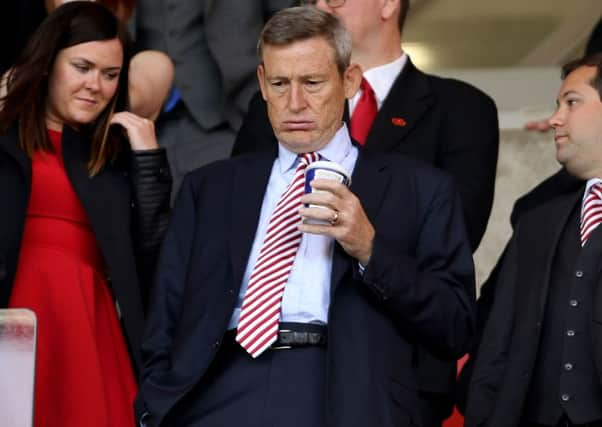Why Sunderland won't face wage-bill Armageddon of Newcastle if relegated '“ but will still be in big trouble


This is a club that has spent four sorry successive seasons confined to the dregs of the Premier League table, yet a whopping £70million of the (roughly) £100m annual turnover is allotted to salaries.
That sum puts Sunderland’s wage bill among the top 10 in the country – more than Southampton, Leicester, Swansea and West Ham.
They’ve hardly reaped a value-for-money return ...
Advertisement
Hide AdAdvertisement
Hide AdSunderland are not paying out outrageous fees for individual players; certainly nothing akin to the £80,000 a week banked by Newcastle’s January signing Jonjo Shelvey.
But, collectively, there has been too much going out the coffers on either average players, ones that barely feature or supplementing the wages of those unwanted figures who have left on loan – the likes of Will Buckley and Liam Bridcutt – where their Championship employers are only paying around half of their pay packet.
Long-term, one of the principal requirements of Sunderland’s next chief executive is to ensure that the wage bill is a truer representation of the club’s league position.
At least, every Sunderland player has a 40 per cent wage reduction built into their contract in the case of relegation.
Advertisement
Hide AdAdvertisement
Hide AdIt has been compulsory club policy ever since returning to the Premier League in 2007 and, although it has put off some potential transfer targets, Sunderland will not be facing the wage-bill Armageddon of Newcastle if they go down, with only a fraction of the Magpies’ squad having a reduction clause.
With four loanees departing, out-of-contract Steven Fletcher, Danny Graham and probably Wes Brown going – plus the club now saving £60,000 a week on Adam Johnson – Sunderland’s situation would immediately be a tad healthier if they do suffer the drop.
But no-one should kid themselves that those savings will be sufficient to balance the books in the Championship, particularly with Financial Fair Play much more rigorously patrolled in the Football League than it is in the top flight.
As the telling sentence in Sunderland’s last annual report read: “The directors consider the major risk of the business to be a significant period of absence from the Premier League.”
Advertisement
Hide AdAdvertisement
Hide AdIf Sunderland miss out on the £100m annual bounty from the new television deal, then the financial reality of life in the Championship is stark.
For starters, their income from TV money would instantly be reduced to around £2m a year.
Under the new arrangements for parachute payments, Sunderland would receive around £90m over a three-year period.
That’s not a great deal more than the income currently banked from television cash in a solitary season.
Advertisement
Hide AdAdvertisement
Hide AdThe club’s stand-out figures would have to be sold, while the unsavoury side of relegation is that non-playing staff invariably lose their jobs.
There is never any fairness when players banking £30,000 a week are kept on, while those barely earning that in a year face redundancy, but it’s a sad reality.
Sunderland were beginning to consider those deemed dispensable two years ago and Aston Villa similarly announced earlier this week that there will be job losses stemming from their imminent relegation.
Don’t forget that the Black Cats continue to post hefty annual deficits too.
Advertisement
Hide AdAdvertisement
Hide AdThere has been a reliance on Ellis Short’s pocket for years to bankroll Sunderland’s spending in the transfer market and that would have to remain the case in the Championship.
Sunderland don’t have the luxury that Burnley enjoyed after relegation last season, when they were able to splash out £9m on one of the Championship’s top goalscorers, Andre Gray.
Burnley had banked the money from their single-season stint in the Premier League (posted £30m annual profits last month) and brought in Gray to spearhead a promotion push which sees them very much on track to return to the top flight at the first time of asking.
Short’s willingness to copy Burnley and return to the Premier League immediately will be tested and relied upon if Sunderland are to rebuild a side capable of promotion.
Advertisement
Hide AdAdvertisement
Hide AdThere’s no guarantee that Sunderland would be the big spenders of the Championship, as they were in 2006-07 after the Drumaville takeover.
Of course, these are hypotheticals, with Sunderland facing a huge chance to stay on the Premier League gravy train if they can secure victory at relegation rivals Norwich on Saturday.
But should Sunderland suffer defeat at Carrow Road, then they will suddenly become very real considerations.